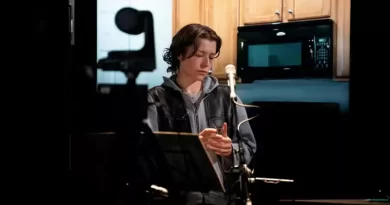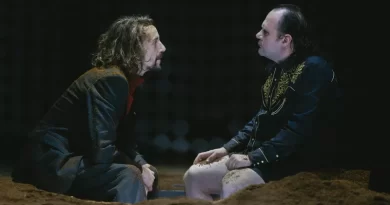“Roots” at Almeida Theatre
Jeremy Malies in North London
4 October 2024
“My people are not caricatures. They are real (though fiction), and if they are portrayed as caricatures the point of all these plays will be lost.” Such are Arnold Wesker’s instructions to theatre companies at the start of the playtext for his 1958 Roots. This is followed by pronunciation guidance and enough linguistic advice to befuddle Noam Chomsky.

Set by Naomi Dawson.
Photo credit: Marc Brenner.
It’s some ask, even a bit intimidating perhaps, but director Diyan Zora (and perhaps just as crucially dialect coach Edda Sharpe) deliver all this magnificently with the fulcrum being Morfydd Clark as protagonist Beatie.
What struck me most was Wesker’s clear-sighted unpatronizing treatment of the rural poor, a theme that only seems to be dealt with in our own day by Barney Norris. The setting here is South Norfolk (not Wesker’s actual province, he was a Londoner) and a livestock farming community that he clearly knows well and respects.
Showing Beatie’s outlook broadening through a relationship with an unseen Communist boyfriend (“He’s an intellectual, failed all his exams …”), Clark draws on prodigious technique to portray a character at odds with her stultifying surroundings and the horizons of relatives ground down by hard labour. And yet this is the premiership of Harold Macmillan, the era of “You’ve never had it so good” with characters talking about infrastructure projects on the edge of their village. An unexpected letter proves a turning point in the plot, and as Clark shows her character digesting its contents, she manages to suck the air out of the building as we watch a young person’s life hopes being deflated.
I don’t believe that Wesker is criticizing state education here. During a huge exchange with her mother (played by Sophie Stanton) we understand the heroine’s rage on account of never having had an abstract conversation of importance with her parents or being helped to understand a newspaper. If she has roots as per the title in this hamlet near the market town of Diss, she can draw no succour from them and is ill-equipped for life elsewhere or for being an interesting companion to people from other backgrounds.
Zora’s direction needs only to be a gentle hand on the tiller for us to marvel at Wesker’s prescience. In 2024, the social mobility of the late 1950s and the 1960s has come to a halt, and the mutually assured Cold War nuclear destruction (Michael Abubakar playing farmhand Jimmy spells the phrase out) seems upon us again but in the Middle East. And it should be remembered that Wesker was jailed in 1961 for non-violent resistance to the proliferation of nuclear weapons.

Sophie Stanton and Morfydd Clark.
Photo credit: Marc Brenner.
The Almeida is not an in-the-round venue but it’s almost as though the playing area in Naomi Dawson’s set is circular (there is a slow revolve) and the sparse furnishings allow a slick transition between two domestic interiors with characters remaining on the edge of the playing area when not involved and handing each other props.
Perhaps the revolve indicates that while poor Beatie can strike out for London, she ends up back in Norfolk listening to her gorgon mother counting out the hours as the country bus passes the door and droning through traditional Norfolk ballads. Abubakar’s character speaks of bringing in the Territorial Army to break a London bus strike which put me in mind of transport disputes in our own day. Last staged in a major revival in 2013 at the Donmar (where the set was realistic rather than the abstract treatment here) the play has picked up topical relevance. I was not alone in guffawing over the line: “You won’t bring socialism to a country by making speeches!”
Costumes (Tomás Palmer) capture the era with items as basic as a ghastly brown tank top. Lighting (Lee Curran) keeps the house lights up at perhaps a quarter throughout. Curran uses filters that suggest a Fifties Polaroid and elsewhere he riffs on elements such as the bilious-green crockery that is so evocative of the era. (This is a kitchen-sink drama in every sense.) There is wonderful support across the cast, notably from Tony Turner who plays a decrepit former labourer, now at the stage of dementia where his social inhibitions have evaporated. It’s made clear that he is not receiving any medical care.
The Almeida is staging John Osborne’s Look back in Anger at the same time, almost on a traditional repertory basis, with many actors appearing in both and the extraordinary Clark anchoring matters by playing a pair of lead roles.
It’s to be hoped that Zora might tackle the other two plays in Wesker’s thematically linked trilogy, these being I’m Talking about Jerusalem and Chicken Soup with Barley. In the latter, the unseen (here) communist Ronnie is a focus. Zora has a feel for the post-war period both in works of that era or new pieces that reflect on it, and he never tries to warp texts out of their own guise. This now sits with Mom, How Did You Meet the Beatles? at Chichester Festival Theatre and English at the Kiln Theatre in Zora’s impressive body of work.
But this project begins and ends with Clark playing Beatie. It’s a bleak ending as Beatie says: “The world is full of people who don’t do what they want to do.” I left the theatre caring about her as much as any of my heroines in Tom Stoppard or Tennessee Williams. The Bildungsroman form and the theme of a mind opening up are unlikely to go out of fashion any time soon. This is, as Beatie says of the Bizet music she puts on the gramophone, “not highbrow but full of living”. The Almeida team has rendered the play fresh, topical and exciting. To use another Beatie phrase, it all comes together, it knits. Outstanding.









